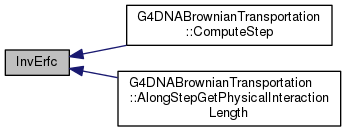|
Geant4
10.03.p03
|
|
Geant4
10.03.p03
|
#include <CLHEP/Random/Stat.h>#include "G4DNABrownianTransportation.hh"#include <G4Scheduler.hh>#include "G4PhysicalConstants.hh"#include "G4SystemOfUnits.hh"#include "Randomize.hh"#include "G4Molecule.hh"#include "G4RandomDirection.hh"#include "G4ParticleTable.hh"#include "G4SafetyHelper.hh"#include "G4TransportationManager.hh"#include "G4UnitsTable.hh"#include "G4NistManager.hh"#include "G4DNAMolecularMaterial.hh"#include "G4ITNavigator.hh"#include "G4ITSafetyHelper.hh"#include "G4TrackingInformation.hh"
Go to the source code of this file.
Macros | |
| #define | State(theXInfo) (GetState<G4ITBrownianState>()->theXInfo) |
| #define | RED "" |
| #define | LIGHT_RED "" |
| #define | GREEN "" |
| #define | GREEN_ON_BLUE "" |
| #define | RESET_COLOR "" |
Functions | |
| static double | InvErf (double x) |
| static double | InvErfc (double x) |
| static double | Erfc (double x) |
| #define GREEN "" |
Definition at line 83 of file G4DNABrownianTransportation.cc.
| #define GREEN_ON_BLUE "" |
Definition at line 84 of file G4DNABrownianTransportation.cc.
| #define LIGHT_RED "" |
Definition at line 82 of file G4DNABrownianTransportation.cc.
| #define RED "" |
Definition at line 81 of file G4DNABrownianTransportation.cc.
| #define RESET_COLOR "" |
Definition at line 85 of file G4DNABrownianTransportation.cc.
| #define State | ( | theXInfo | ) | (GetState<G4ITBrownianState>()->theXInfo) |
Definition at line 65 of file G4DNABrownianTransportation.cc.
|
static |
Definition at line 111 of file G4DNABrownianTransportation.cc.


|
static |
Definition at line 96 of file G4DNABrownianTransportation.cc.


|
static |
Definition at line 101 of file G4DNABrownianTransportation.cc.

